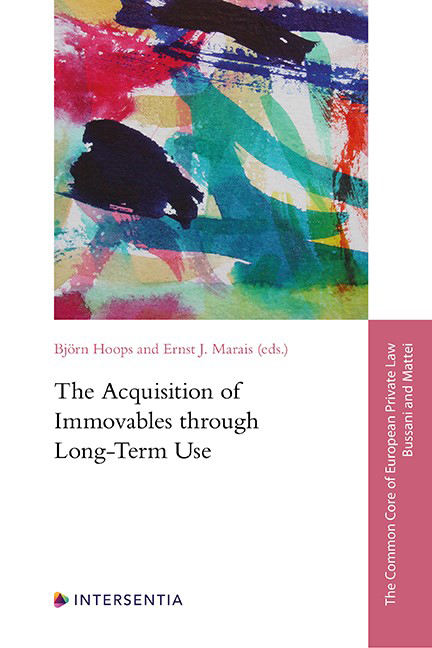Book contents
- Frontmatter
- General Editors’ Preface
- Preface
- Contents
- List of Cases
- Table of Legislation
- List of Abbreviations
- List of Contributors
- Case PART I INTRODUCTORY MATTERS
- PART II CASE STUDIES
- PART III GENERAL CONCLUSIONS
- Appendix I Instructions for the Project on the Acquisition of Immovables through Long-Term Use
- Index
Comparative Analysis – Case 2
Published online by Cambridge University Press: 26 May 2022
- Frontmatter
- General Editors’ Preface
- Preface
- Contents
- List of Cases
- Table of Legislation
- List of Abbreviations
- List of Contributors
- Case PART I INTRODUCTORY MATTERS
- PART II CASE STUDIES
- PART III GENERAL CONCLUSIONS
- Appendix I Instructions for the Project on the Acquisition of Immovables through Long-Term Use
- Index
Summary
GENERAL INTRODUCTORY REMARKS ON CASE 2
Case 2 concerns a situation where successive persons used the land unlawfully for extended periods and where the owner is unknown. The variations touch on where the land has been used by the present user’s predecessor for a very long period (Variation 2.1.), the aggregation of successive periods of use when the current user’s predecessor only used the land for a short period (Variation 2.2.), and, finally, where the land is unregistered (Variation 2.3.). The below headings address each of these aspects.
COMPARATIVE REMARKS ON VARIATION 2.1.
INTRODUCTION
Variation 2.1. addresses two issues, namely (i) whether very long periods of successive land use may result in the acquisition of the land and, if so, what steps the present user, Hannah, must take to ensure that her presence is not challenged; and (ii) whether a lack of information on the person and whereabouts of the land’s owner have a bearing on the acquisition of the land through long-term use. The first heading below addresses the first question, whereafter the second matter receives attention.
ACQUISITION OF LAND THROUGH VERY LONG PERIODS OF SUCCESSIVE USE
In Variation 2.1., reporters had to indicate whether Hannah may acquire land on which she has lived for 20 years. She obtained control of the land from her late mother, who lived there for 70 years. No one knows under what circumstances Hannah’s mother and her family began living on the land. The jurisdictions may be divided into two groups as regards whether Hannah can acquire the land. The Land Registration Act of 2002 (LRA 2002) in the law of England and Wales is not considered here because it is not applicable to uses dating back so far into the past.
ACQUISITION OF LAND THROUGH LONG-TERM USE OR THROUGH INHERITANCE
Countries in the first group allow Hannah to acquire the land, though they may be divided into two sub-groups as regards the ways in which they permit this acquisition. The first sub-group, which comprises Spain, Catalonia, France, Alberta, Louisiana, Italy, Belgium, Ireland, Norway, Russia and Slovakia, allow her to acquire the land through long-term use.
- Type
- Chapter
- Information
- The Acquisition of Immovables through Long-Term Use , pp. 635 - 642Publisher: IntersentiaPrint publication year: 2022

